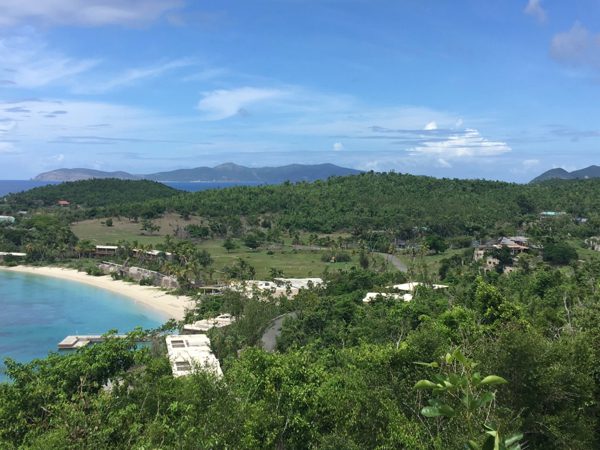 Well folks, we’ve given you a couple of updates on Cinnamon Bay over the past few days. Now it’s time to update you on Caneel. Unfortunately just like Cinnamon, not much has happened over there since we’ve last reported on this. So why the update today? Well it’s because we just received a copy of the original Retained Use Agreement from 1983. I found it to be rather interesting, and I think many of you may too.
Well folks, we’ve given you a couple of updates on Cinnamon Bay over the past few days. Now it’s time to update you on Caneel. Unfortunately just like Cinnamon, not much has happened over there since we’ve last reported on this. So why the update today? Well it’s because we just received a copy of the original Retained Use Agreement from 1983. I found it to be rather interesting, and I think many of you may too.
But first, let’s pay a quick game of catch up for our new readers. As you know, Caneel sustained tremendous damage during Hurricane Irma, and the resort has been closed ever since. Currently, there are no repairs being done. CBI Acquisition, the firm that manages Caneel, stated that it will remain closed until December 2019 (if not longer).
CBI Acquisitions is currently operating Caneel under a Retained Use Estate (RUE), which went into effect on Sept. 30, 1983. The agreement was set to expire after 40 years – 2023. Because there is only five years left of the agreement, CBI Acquisition is seeking an extension. They have stated publicly that they will not rebuild the resort without one. Congresswoman Stacey Plaskett introduced a Bill in December 2017 that called to extend the RUE for a period of 60 years. That Bill has created a great deal of contention on both sides.
You may be asking yourself why people wouldn’t want CBI to receive an extension. Well, for many, it’s due to the language in the Bill. (Click here to read it.) For others, it’s because of original intention of the RUE once it expired. The RUE states:
“It is the Grantor’s expectation and intention that at some future time, to be determined by Grantor pursuant to the provisions set forth herein, the Retained Use Estate will be terminated and extinguished in order to carry out the longstanding objective of Grantor that the Premises ultimately be an integral part of the Virgin Islands National Park (the “Park”) under the jurisdiction of the Secretary for the use and enjoyment by visitors to the Park out of outstanding scenic and other features of national significance located both within the Premises and in other areas of the Park. In keeping with this objective, Grantor agree that, at all times prior to the termination of the Retained Use Estate pursuant to paragraph numbers 8 below Grantor all use and maintain the Premises in such a manner that will (a) be consistent with the preservation of such outstanding scenic and other features of national significance and (b) preserve the Premises to the extent feasible in their natural condition for the public benefit, enjoyment and inspiration, subject, however to the right go Grantor to operate guest facilities for the accommodation of visitors to the Park on the Premises as provided for in paragraph numbered 3 below.”
The document was signed by Laurence S. Rockefeller on September 13, 1983.
Click here to read the 1983 Retained Use Estate in its entirety.
Ok, so let’s get back to Plaskett’s Bill H.R.4731. Back in March, it passed the House Natural Resources Subcommittee on Federal Lands. It now has to pass the full House of Representative, as well as the Senate before it is sent to the President to be signed into law.
(Side note: CBI Acquisition, the firm that currently manages Caneel, spent $330,000 on lobbying in 2017. They spent $215,000 in 2018. According to opensecrets.org, all of that money was spent with regard to H.R. 4731.)
The second session of the 115th Congressional Congress ends during the third week of December. That means if Plaskett’s Bill is not signed into law by then, it’s dead. It will then have to be re-introduced during the next Congressional Session.
And a little more food for thought before we leave you today… 12,427 Bills and Resolutions were introduced during the 115th Congressional Session. Of those, only 244 Bills have been enacted into Law. That’s a mere two percent. And only five percent of the Resolutions passed.
I don’t know what else to say other than it’s going to be a long and drawn out process with this one. And as always, we will continue to keep you updated on any new developments.


While the profiteers & politicians & lobbyists play footsie, the people who WORKED at Caneel have no jobs. What do the ‘people on the street’ think about this?
Hi! Thank you so much for this update! Do you know how many people from the island Caneel Bay employed? We have stayed at Caneel at least 7 times. The last time we were there was about 2 weeks before Irma hit. Our kids grew up going there. We love Caneel and St. John— one of our favorite places on earth!! We were supposed to stay there summer 2019.
I agree 100% Jamie, the few times we have stayed at Caneel on Scott beach, it definitely had become your exact phrase, “one of our favorite places on earth!”. The whole situation is sad and needs remedied soon, so rebuilding can begin. We’ve been down twice since Irma and hard to believe how bad Caneel still looks.
Hi: Are the beaches on the Caneel peninsula open to the public while this conundrum of rebuilding is decided?
All the beaches in the USVI are public. You cannot traverse private land to get to them, but you can access all by water. Caneel will not allow anyone to walk or drive on their property.
But are they not breaking the agreement by not maintaining the area? Just asking if they are still responsible.
Jen:
Thanks for the update – I too am very sad that Caneel will not be up and running – I looked forward every year to the smiling faces of all those that worked there – and the food was great! Just breaks my heart. If there is anything we can do state side let me know.
The proposed extension is a sham. Ground rent of 1.2% of gross revenues for one of the prime parcels of land in the US is so below market that it is laughable. Especially taking into account that public owned land is not open to the public. I also question whether the resort pays any property taxes since it is located on federal land. Caneel has been run as a colonial outpost. It has not given back to the island. How about requiring that the owners build and maintain new schools for island residentsat a minimum.
I understand Caneel security is currently chasing visitors off the beaches, even those who arrive via water. All U.S. Virgin Island beaches are public and access from the water is guaranteed- not to mention the fact these are National Park beaches.